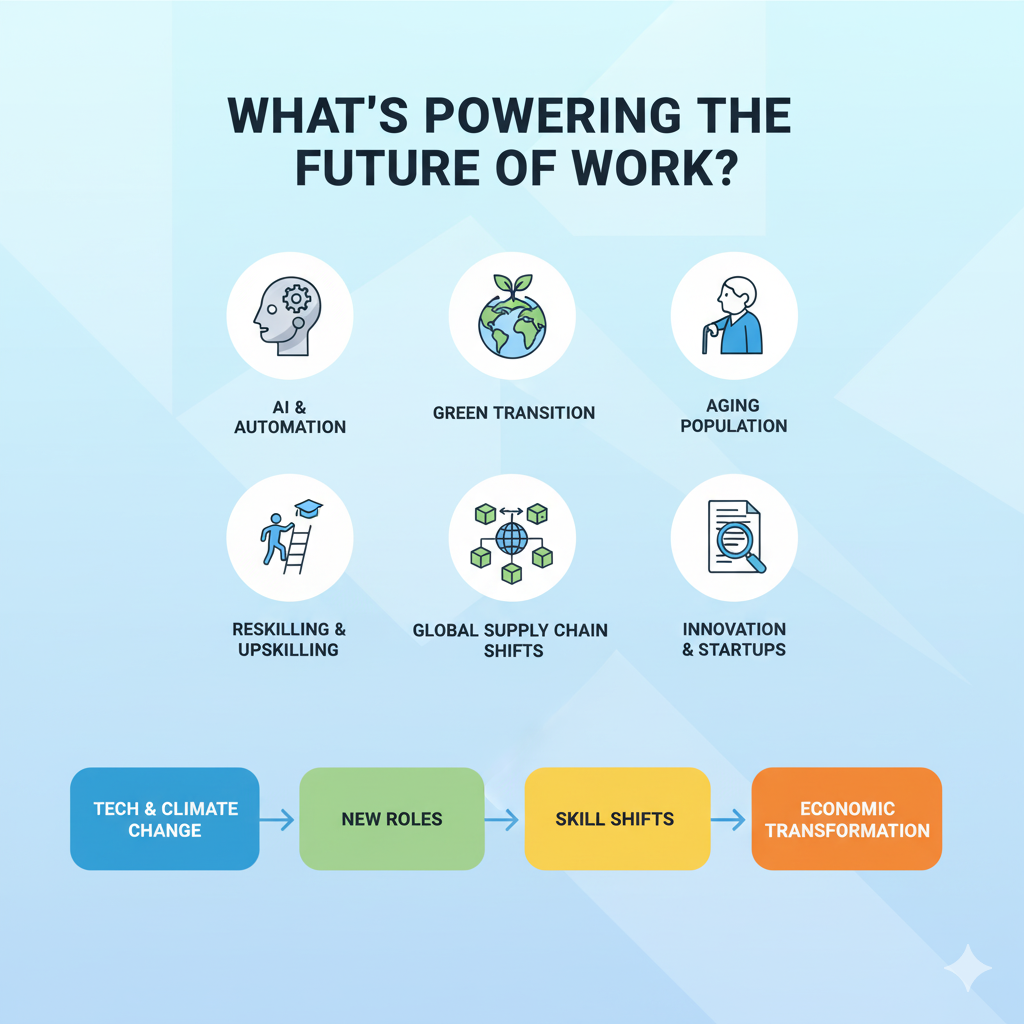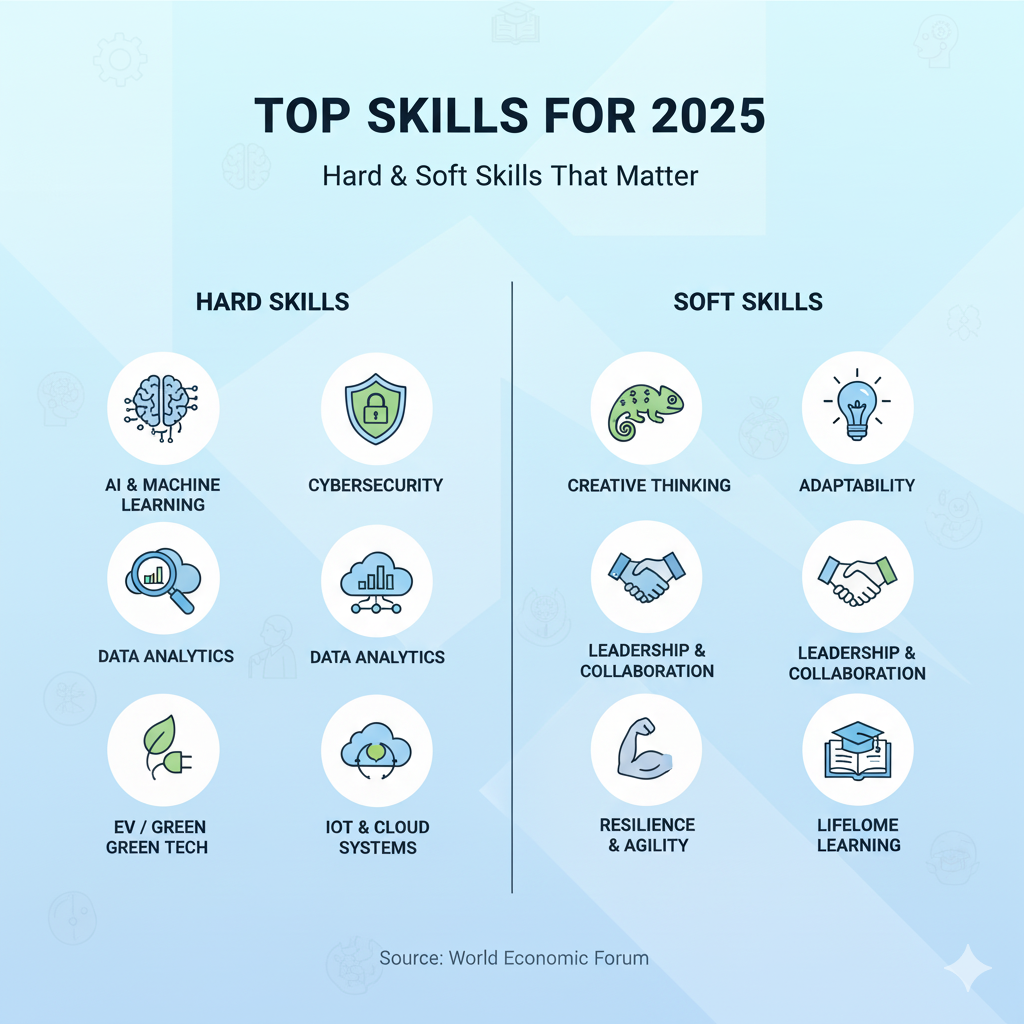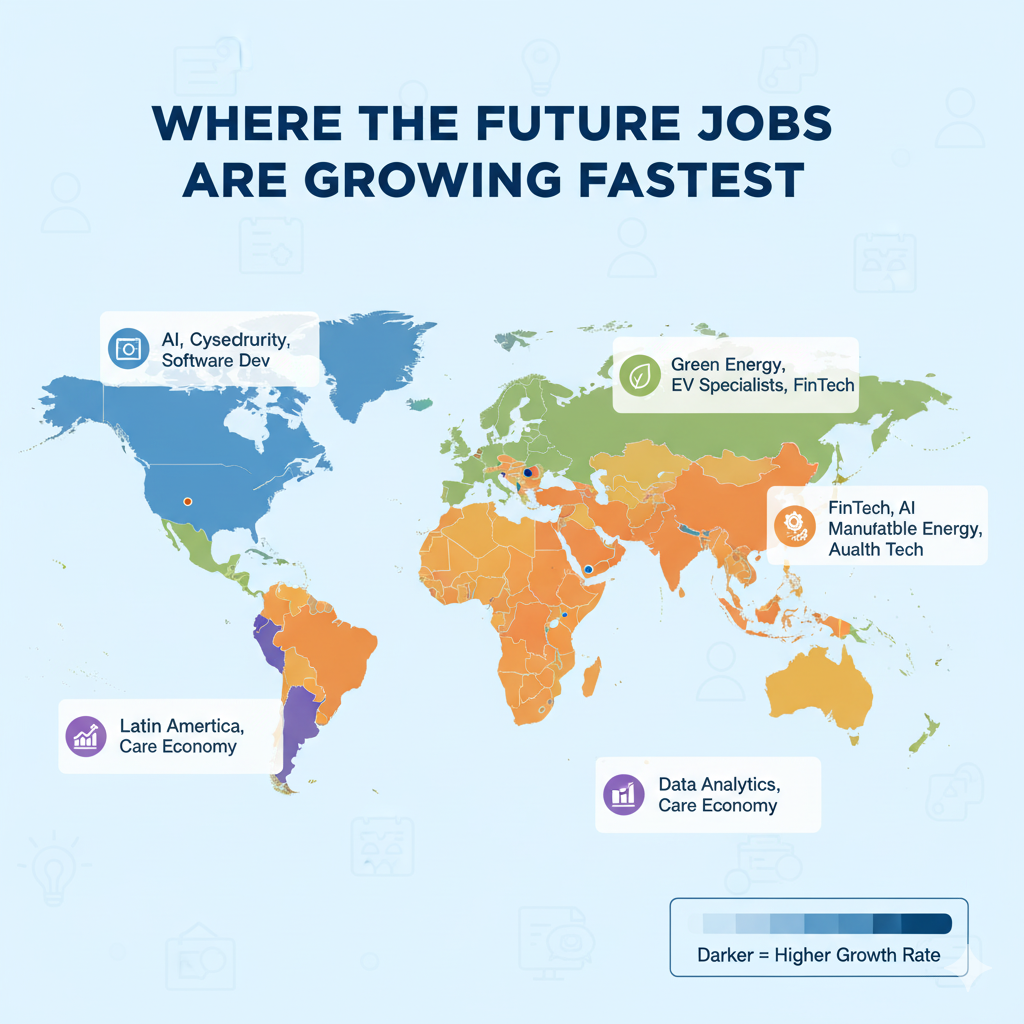If there was ever a year that marks a turning point for the global job market, 2025 is it. Rapid advances in artificial intelligence, clean energy, automation, and data-driven industries are reshaping what it means to have an in-demand skill. While some roles are fading, others are emerging faster than ever, driven by the digital economy and global sustainability goals.
This article breaks down the fastest-growing job roles of 2025, based on data from the World Economic Forum’s “Future of Jobs Report” and supporting insights from global labor studies. You’ll find which sectors are growing, what skills are driving the change, where the biggest opportunities lie by region, and how to prepare yourself to thrive in this new landscape.

To understand emerging roles, you need to understand the engines behind them. These five forces are reshaping demand.
AI, machine learning, robotics, and big data are rewriting how work is done. Tasks once handled manually are increasingly automated, while new roles have sprung up to design, manage, and secure these technologies. In the Future of Jobs Report 2025, three of the fastest-growing roles are big data specialists, FinTech engineers, and AI/ML specialists.
Countries and industries are accelerating the shift to sustainable energy, electric vehicles, carbon capture, and decarbonization. This fuels demand for engineers, environmental analysts, renewable energy technicians, and specialists in energy storage and grids.
Aging populations in many developed countries are increasing demand in healthcare, elder care, and wellness sectors. Meanwhile, birth trends and urbanization in emerging economies push demand for education, child care, and social services.
Global supply chains are being reshaped by geopolitics, trade policy, and localized manufacturing. This drives demand for logistics experts, supply chain technologists, and compliance specialists who understand cross-border dynamics.
Rapid disruption means many current skills will become obsolete. According to WEF’s 2025 report, 39% of workers’ key skills will need to change by 2030. Organizations and individuals that invest in continuous learning, upskilling, and reskilling will be best placed to capture opportunity.
Here’s a refined list of the fastest-growing roles according to the WEF Future of Jobs Report 2025, along with supporting data from Visual Capitalist and related projections.
Note on metrics: Growth rates from Visual Capitalist refer to percentage increases (2025–2030) rather than year-on-year projections. The WEF also uses employer survey projections and sectoral modeling to estimate growth.

To land one of these roles, individuals and organizations must focus on skillsets that bridge the technical and human domains.
The WEF’s 2025 report names AI & big data, network & cybersecurity, and technology literacy among the fastest-rising skill domains.
These human-oriented skills are increasingly described as complementary to AI rather than competing with it.

Emerging job roles are not uniform globally; each region has its own path and constraints.
The U.S. and Canada lead in AI, cybersecurity infrastructure, and cloud tech roles. Silicon Valley and other tech hubs drive demand for developers, data scientists, and security specialists. Growth in EV and autonomous vehicle tech is also notable.
Europe leans heavily into sustainability and mobility: EV engineers, renewable energy tech, smart grids, and green policy roles. Also strong in legal, data governance, and privacy roles, given regulatory focus (GDPR, etc.).
Asia’s dominance in FinTech, e-commerce, and data infrastructure is well known. Countries like India, Singapore, and China are pushing AI adoption. Also, manufacturing transitions toward Industry 4.0 spur IoT, robotics, and automation roles.
These regions are on the rise in digital financial inclusion, remote services, agricultural tech, and edtech/learning platforms. Though infrastructure constraints exist, the growth potential for tech-led roles is strong.
Use trusted programs that align with demand:
Employers want people who can code and communicate build projects that demonstrate both technical competence and soft skills.
Contribute to open source, create apps, build dashboards, present case studies. Real demonstrable work carries weight in fast-evolving tech domains.
Take short courses, earn micro-certs, attend workshops. Stay ahead of updates in tools, frameworks, and domain knowledge.
Participate in hackathons, attend webinars, publish articles or blogs about domain topics. Being visible in your niche helps hiring managers notice you early.

Even as the future of work opens exciting opportunities, it’s crucial to recognize the risks and blind spots that come with rapid transformation. Not all “emerging” jobs are created equal and growth projections don’t always translate into equitable, sustainable employment.
1. Uneven Pay and Job Quality: While AI engineers or FinTech specialists can command six-figure salaries, some of the fastest-growing roles: like care aides or education assistants are low-wage yet essential. This creates a dual-speed economy where “essential” doesn’t always mean “well-compensated.” Governments and employers will need to ensure these jobs are both sustainable and dignified, not just plentiful.
2. Over-Reliance on Projections: The WEF’s projections and similar models rely on survey data and policy assumptions that can shift dramatically. Economic shocks (like recessions, pandemics, or geopolitical conflict) can quickly reverse hiring trends. For instance, the surge in AI-related hiring might slow if automation tools consolidate and require fewer specialists.
3. Demand vs. Hiring Gaps: Skill shortages are one of the biggest bottlenecks. Many industries may want AI engineers, green tech experts, or cybersecurity specialists, but there simply aren’t enough trained professionals available. This mismatch leads to “paper demand” without real job absorption, especially in emerging markets.
4. The Skills Paradox: Even as automation creates new technical roles, it can also erode mid-level positions that traditionally served as stepping stones. This means people entering the workforce today must constantly reskill to stay relevant, often outside traditional education systems. Degrees are no longer enough, micro-credentials and continuous learning have become survival tools.
5. Regional Disparities: Some regions lack the infrastructure or policy frameworks to support emerging roles. For example, while Europe and East Asia lead in EV and green transition roles, parts of Africa and Latin America may lag due to energy access or funding constraints. The global workforce is diverging between those who can access the digital economy and those left behind.
6. Ethical and Social Implications: AI and automation raise serious concerns around privacy, surveillance, and bias. As demand for AI professionals grows, so does the need for ethics officers, data governance experts, and responsible innovation leaders. These are emerging fields in their own right but require careful regulatory frameworks.
The future belongs to those who combine technical mastery and human adaptability. In 2025 and beyond, roles in AI, big data, green tech, cybersecurity, and care will lead the charge but success will belong to people who can evolve with them.
Don’t wait to act:
When the world changes fast, it’s not about holding onto past certifications, it’s about staying ready for what comes next.